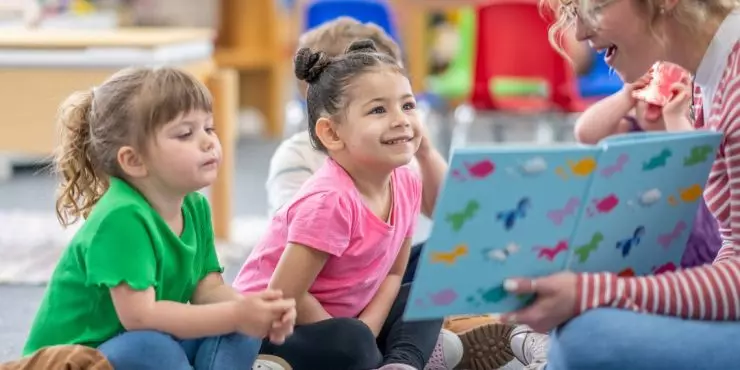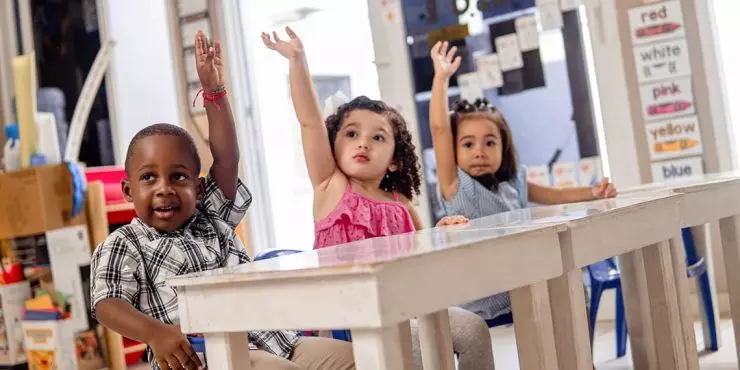
As parents we undoubtedly will make endless decisions regarding our children and how we choose to parent, but one of those many important decisions is when to start your child in preschool. This is a bigger decision than you may realize, and it’s important to consider your child’s individual development and readiness. Checkout our comprehensive guide below to help you determine if your child is ready for preschool, including key milestones, age considerations, and common challenges.
Key Milestones for Preschool Readiness
Every child develops at their own pace, but there are some general milestones that can help indicate preschool readiness. Remember, these milestones are not strict rules but rather guidelines to help assess your child's developmental progress, as every child is unique.
Social Skills:
- Can your child play well with other children?
- Do they share and take turns?
- Are they able to engage in group activities with minimal conflict?
These social skills are helpful for a successful preschool experience, where group play and cooperation are daily activities.
Language Skills:
- Is your child able to communicate their needs, wants, and feelings verbally?
- Can they follow simple directions and understand basic instructions?
- Are they able to express themselves clearly enough for others to understand?
Preschool involves quite a bit of verbal interaction, so being able to communicate effectively (but age-appropriately) is key.
Physical Independence:
- Is your child potty-trained or making consistent progress in this area?
- Can they wash their hands, put on their coat, and manage other basic self-care tasks independently?
- Are they physically able to handle playground equipment and participate in active play?
Physical independence is important in preschool, as teachers may have multiple children to assist.
Emotional Readiness:
- Can your child handle being separated from you for several hours at a time?
- Are they beginning to manage their emotions, such as frustration or disappointment, without extreme reactions?
- Do they show interest in interacting with peers and adults outside the family?
Emotional readiness is about whether your child is prepared to be in a new environment with new people.
Cognitive Skills:
- Does your child show curiosity about the world around them?
- Can they focus on a task, such as a puzzle or story, for short periods?
- Are they beginning to recognize letters, numbers, and shapes?
While academic skills are not required, a natural curiosity and ability to focus for short periods can be beneficial.
Age Considerations
Preschool typically starts between the ages of 3 and 5, but the exact timing can vary based on your child's readiness and your family’s needs. Some children may be ready at 3, while others may benefit from waiting until they are closer to 4 or 5. It’s important to remember that age alone isn’t the best indicator—readiness is key.
For some families, starting preschool at 3 allows children to gradually adjust to a school setting before kindergarten. Others may prefer to keep their children at home or in a less structured environment until age 4 or 5, especially if the child needs more time to develop certain skills.
This decision is very much a personal choice as a parent of what you determine is best for your child.

Common Preschool Struggles and How to Address Them
Even if your child meets the milestones, it’s normal to encounter some challenges as they transition to preschool. Here are a few common struggles and tips on how to navigate them:
- Separation Anxiety: It’s common for children to feel anxious about leaving their parents. To ease this, try practicing short separations before preschool starts and establish a consistent goodbye routine.
- Difficulty Following Routines: Preschool often involves structured routines that might be new to your child. You can help by gradually introducing similar routines at home, such as regular mealtimes and quiet activities.
- Social Challenges: Not all children are naturally social. If your child struggles with social interactions, arranging playdates or enrolling them in a less structured group activity can help them build these skills.
- Overwhelm with Group Activities: Some children may find large groups overwhelming. If this is the case, talk to the preschool about gradually increasing your child's participation or starting with shorter days.
Preschool Readiness Checklist
To help assess your child's readiness, here’s a checklist to consider:
Social Readiness:
- Plays well with other children.
- Shares and takes turns.
- Engages in group activities with minimal conflict.
Language Skills:
- Communicates needs and feelings verbally.
- Follows simple directions.
- Expresses themselves clearly.
Physical Independence:
- Potty-trained or making progress.
- Can manage basic self-care tasks.
- Physically active and able to handle play equipment.
Emotional Readiness:
- Comfortable being separated from parents for several hours.
- Manages emotions without extreme reactions.
- Shows interest in social interactions.
Cognitive Skills:
- Curious about the world.
- Can focus on tasks for short periods.
- Recognizes letters, numbers, and shapes (optional).
If your child meets most of these criteria, they may be ready for preschool. However, remember that every child is unique, and readiness can look different for everyone.
Talk to Your Doctor
Deciding whether your child is ready for preschool is a personal decision that depends on many factors. By considering your child's development in these key areas and discussing any concerns with your pediatrician or family physician, you can make an informed choice that supports your child's growth and well-being. If you have any further questions or need guidance, always remember that your doctor is your number one resource. They know you and your child best and can help support you through this decision and many others as they arise.